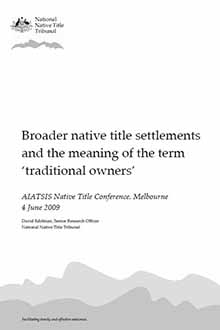Broader native title settlements and the meaning of the term ‘traditional owners’
Many native title claimant groups find it difficult to demonstrate that the relationship they have with their traditional country can meet the standard of proof required for a determination that native title exists. As a result, native title parties have increasingly considered alternative ways to settle claimant applications. These are sometimes referred to as ‘broader settlements’.
One of the requirements applied by governments in broader settlement negotiations is that the members of a claimant group demonstrate that they are the ‘traditional owners’ of the country in question. At times this has been expressed in terms of those people showing that they are ‘the right people for the right country’. But what does the term ‘traditional owner’ actually mean? It does not appear anywhere in the Native Title Act 1993 (Cth) and yet it is common for many Indigenous Land Use Agreements, which are provided for under the Act, to name the Indigenous group or groups which are party to the agreement as those asserting ‘traditional ownership’ of the area of that agreement.
Based on a desktop review of the published literature on the subject, this paper summarises some of the meanings that have been applied to the notion of traditional ownership. The paper was presented at the National Native Title Conference in Melbourne in 2009.
